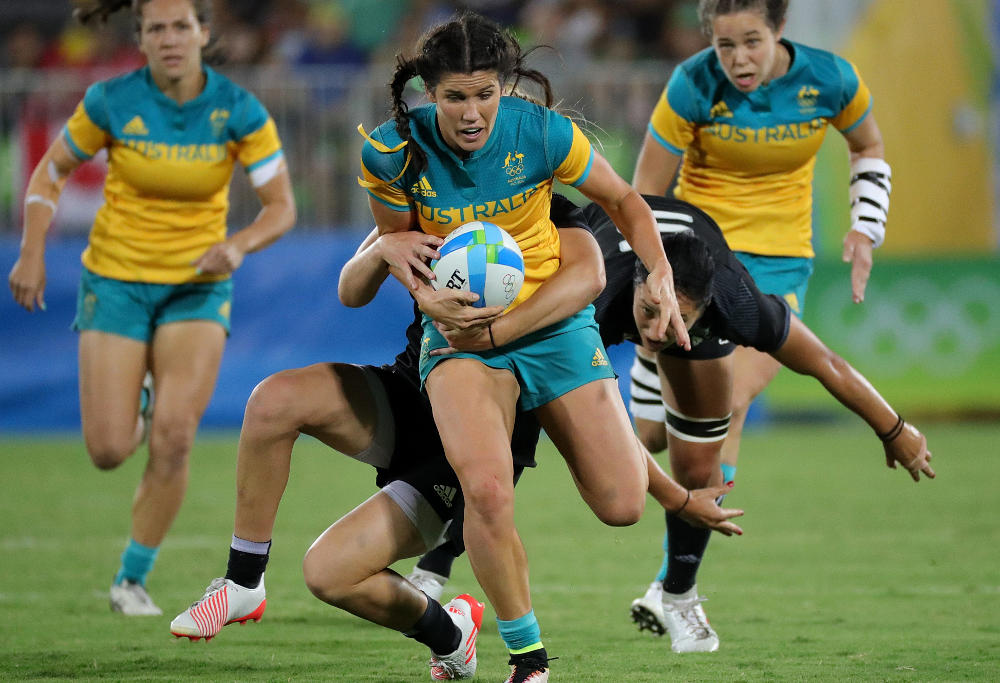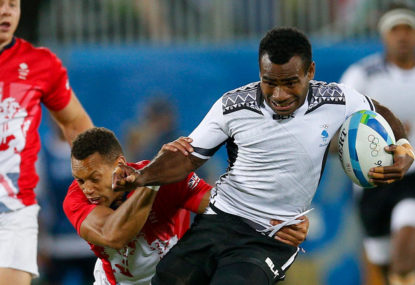So there was this marvellous, stupendous, brilliant (pick your adulatory adjective) Fijian Rugby Sevens side gathered in a circle after their incredible, historic, legendary (add more adjectives if you want) victory in the men’s final at the 2016 Rio Olympics.
In high-pitched harmonies, with arms linked, they sang a hymn. The plangent sounds resounded around the stadium and the world, through worldwide television. This was the iconic moment the Rio Olympic Games needed.
Just as Cathy Freeman’s victory in the Women’s 400m track event at the 2000 Olympic Games at Sydney thrilled the world for what it said about power of social diversity, the Fijian Rugby Sevens side epitomised a wonderful truth about the life-enhancing qualities of sport. It said that ordinary people, no matter their backgrounds, and circumstances can do extraordinary things if given the chance to do so.
As the side’s coach, Englishman Ben Ryan said in the euphoria of the moment: “The team saved the best until last. They played some staggeringly good stuff. We wanted to showcase the way Fijian sports can be played and wanted to put smiles on everyone’s face.”
Mission accomplished.
For the first time since 1924, rugby was at the Olympics, this time in its abbreviated form as Rugby Sevens. And a small nation (900,000 people) that has never won any Olympic medal triumphed in the final against a Great Britain team – an entity that has about ten times more rugby players than there are in Fiji.
What is more the victory was not the hard slog like the quarter-final against the shattered New Zealand Sevens side. In the final, Fiji scored almost from the kick-off. They allowed Great Britain two touches of the ball, only, in the first half.
The rout was maintained throughout the second half with the final 43-7 result. Fiji made a mockery of the usual intensity and closeness of scoring in finals by accumulating points at the rate of just over two for every minute of play.
And it was play of such extravagant skill and power that experts and new-comers to sevens rugby were held in thrall at the wonder of their pace and skills.
What an exhibition of Sevens Rugby for the watching world to take in and embrace. Rugby lovers could not have hoped for a better outcome for the sport. If Fiji can do it, perhaps Japan, which startled the rugby world (shades of Rugby World Cup 2015) with a victory over the All Black sevens, can take out gold at the next Olympics. Or Spain, or Kenya, or even Brazil at a future Olympics.
Even ardent All Blacks supporters will come around to agreeing, I reckon, that for the spread of rugby around the world, this Olympic gold by Fiji and the manner in which it was achieved in the final ranks with the Springboks “rainbow coalition” Rugby World Cup 1995 victory as a turning-point moment in the game’s spread around the world.
The point here is that the rugby ethic is all about democracy. All shapes and sizes have a role in the game.
Now, the game is democratic with vibrant women and men’s tournaments. And with Fiji’s victory at Rio, there is the reality that here is a form of the game, sevens rugby, that allows virtually every rugby country, small or big, the possibility of competing and defeating the traditional powers in the 15-person game.
And here we bring in again for high praise, the Australian Women’s sevens side.
They had a slightly tougher final against their traditional foes, the New Zealand Women’s Sevens side. But, in the end, it was an emphatic four tries to three victory that was nowhere near as close as the scoreline 24 – 17 suggests.
Like the Fijians, the Pearls went into the tournament as the favourites. For a one-off tournament like the Olympics this sort of standing can be difficult to manage. Ask Serena Williams, or Cate Campbell about her performance in the women’s 100m swimming event.
Favouritism imposes expectations that are sometimes very difficult to manage. You have to be confident, if you want to win, but the temptation is to worry about being over-confident, which in turn can turn the athlete from the necessary nerveless mode to such a state of nerves that the performance is traumatised.
Both Fiji and the Pearls managed their expectations superbly. Both of them kept their best for the last. And most importantly, as the sevens rugby event was something of a missionary expedition going out to a non-rugby world, both of the teams played fast, skilful, powerful and adventurous rugby.
Both teams established the truth that Sevens Rugby is a genre of the rugby game that has its own imperatives, systems and dynamics.
Where most of the other teams, including the All Black Sevens (men and women) and the Australian Men’s Sevens, played as if they were involved in a mini-15s competition, with an emphasis on power and physicality, the Pearls and the Fijians played with speed above all, speed, skill, fierce tackling (which is an essential element of rugby whatever the numbers on the field) and with a flair and desire to score points.
I raise this last aspect because I could not believe my eyes during the men’s final when Great Britain, on one of their rare touches, actually kicked the ball into touch. Fiji actually lost the lineout but moments later they raced away once more to score yet another try.
Something else caused me to blink somewhat and wonder if what I was reading had actually been said was the comment by the Australian hockey great, as a player and a coach, Ric Charlesworth that Women’s rugby eevens at Rio was a “soft event.”
According to Charlesworth, the standard of the competition wasn’t strong: “I don’t think they had a try scored against them well into the competition, so some events are much easier than others.”
This is spoken like a true ignoramus. Ric listen up! The reason why the Pearls conceded very few tries was because their tackling was truly ferocious.
Shannon Perry, the captain of the Pearls, has some further information for Ric Charlesworth: “R.O.A.R, it’s a philosophy for the team… it stands for: Rough bitches, Olympic dreams, Accountability and Respect.
“I love crunching anyone on the field. You get the adrenalin rush when you put someone on their backside or get that turnover for the team.”
That doesn’t sound very soft to me. If Charlesworth is a responsible sports administrator he needs to retract this comment about the Pearls. He needs to understand that defence in rugby involves as much, if not more physical commitment and pain (Pearls star Chloe Dalton has had three broken arms!) than hockey women or men are subjected to.
 T
T
It seems to me that the undoubted success of Sevens Rugby at Rio has confirmed that the game now has three forms that allow for the spread of the game throughout the world and for different groups of players to enjoy.
There is the traditional 15-person/80 minute game that can be played for many months in various tournament formats, club, provincial and Test.
Then there is the 10-person/20 minute game that is played in tournaments lasting two or three days. This format is going fully professional in Brisbane early next year with an exciting tournament featuring several Super Rugby teams and Toulon.
And the 7-person/14 minute game that can and is played in tournaments at all levels of competition, over several days, from school-kids through to the Olympics.
Sevens Rugby has the explosive attraction of T20 cricket and could/should be marketed as Speed Bash rugby. With an Olympics exposure and a professional circuit playing around the world, this is a format that has enormous potential in terms of exposure and generating money for the rugby game.
The 15-person game has its greatest heights in the various Test formats, the Rugby World Cup tournament every four years and its reach downwards into the amateur game at the grassroots level.
I leave the last word on all of this to the new chairman of World Rugby, Bill Beaumont: “Olympic inclusion has been a game-changer for our sport, inspiring a new generation of players and fans. Since being voted back on to the programme in 2009, we have seen participation double to 7.73 million… we will continue to encourage children to try, play and stay in the game through our mass participation GET INTO RUGBY programmes in schools and sports clubs.”
Often expressions like this are words that disappear virtually as soon as they are uttered. But not this time. Entry back into Olympics is truly a game-changer for rugby.
Which brings us back to those Fijians, now immortals in their Sevens-mad nation, gathered in their circle, singing together humbly in victory and creating an unforgettable rugby and Olympic image.






























































































 T
T